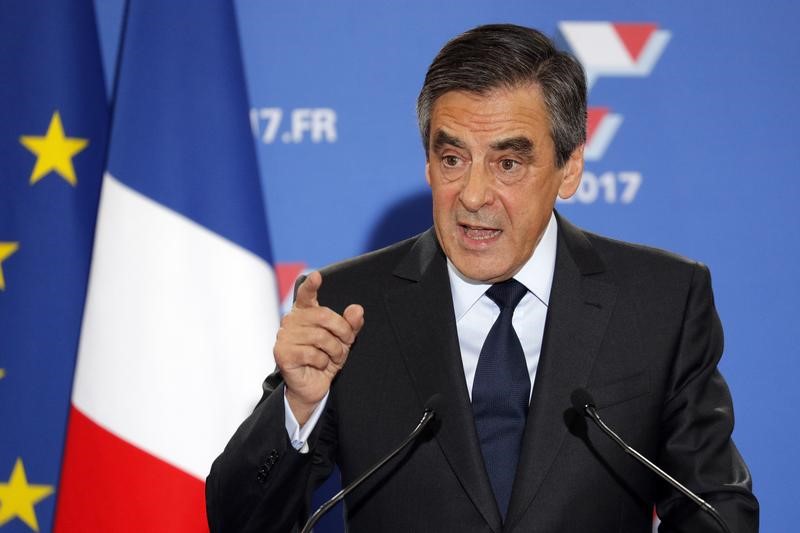By Brian Love
PARIS (Reuters) - Francois Fillon, centre-right candidate in France's presidential election as of Sunday and pollsters' favourite to win that vote next May, is a social conservative and free marketeer who wants to cut half a million public sector jobs.
Behind a mild, refined demeanour, the 62-year-old who won his Les Republicains party primaries, says he will slash the cost of government.
An admirer of late British Prime Minister Margaret Thatcher, Fillon, who has spent half his life in politics, goes into battle against an increasingly popular far right led by Marine Le Pen and against the divided left of unpopular President Francois Hollande.
He is married to the Welsh-born Penelope and they have five children. He was the youngest member of France's parliament when he was first elected a member of parliament 35 years ago.
As a minister in 2003, he stood down big street protests when he championed reforms extending the age at which people are entitled to retirement pension payments.
He promises this time that raising the retirement age to 65 and ending early pension rights for many in the state sector will be one of his first measures if he wins power next May.
His proposal of free market reform, more hard-hitting than that of the man he beat in Sunday's primary vote, Alain Juppe, is seen as radical in a country where the dirigiste state is a staple across the political spectrum.
On winning his party's nomination contest, he said: "The left (Hollande) has failed and the far-right (Le Pen) means bankruptcy. My job is to rise to the challenge of changing France and changing its software."
Fillon loves driving race-track cars at the Le Mans circuit near his political fiefdom in western France.
He was prime minister from 2007 to 2012 under President Nicolas Sarkozy, a leader he endured more than he admired.
Sarkozy, who lost power to Hollande in 2012 and failed to make it to the runoff of his party's primary for a 2017 contender, once described Fillon as little more than a member of staff, calling him in French his "collaborateur".
That did not stop Fillon saying at the time that France, in the midst of an international economic slump, was verging on bankruptcy and needed to change its ways.
Fixing that is essentially what Fillon's manifesto says he will do now if elected head of state.
He has said he will get rid of 500,000 public sector jobs in five years and abolish the 35-hour week, immediately putting the public service back on a 39-hour week. He even says that those 39 hours do not need to be fully compensated by pay rises.
CATHOLIC ROOTS AT HOME, PRO-RUSSIA ABROAD
Born in the Sarthe region some 200 km west of Paris, where secular France's Roman Catholic roots remain strong, Fillon has also distinguished himself by seeking to curb the adoption rights of gay couples.
He says he is personally opposed to gay marriage, although he would not repeal a 2014 law legalising it. He has also said he is opposed to abortion but would not change France's laws that allow it.
In a country where more than 230 people have been killed in Islamist militant attacks over the past two years, he stands out in not proposing a rise in police recruitment.
Fillon has also raised eyebrows in Germany by espousing warmer ties with Russia than Hollande has pursued.

He says Russian President Vladimir Putin is no threat to the West and should be a partner rather than a rival in the foreign intervention in Syria. He also says European sanctions against Russia imposed after its annexation of Crimea should be lifted.